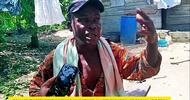Environmental activists have petitioned Washington to open up an investigation into the land acquisition and forest exploitation activities of a U.S.-owned palm oil firm, Herakles Farms, in Cameroon’s southwest.
"Mais qu'est-ce que j'ai fait de mal ?" Mercredi 5 juin, à Puteaux, Vincent Bolloré s'enveloppe d'une candeur inhabituelle pour un capitaine d'industrie aux dents longues, dont le chemin vers la réussite est jalonné des cadavres de concurrents plus tendres que lui
La multinationale française Bolloré s’est accordé jusqu’au 30 juin pour donner suite aux revendications des paysans riverains de ses plantations, qui manifestent dans plusieurs pays africains contre l’expansion des activités du groupe sur leurs terres.
Ils ont saisi le gouvernement américain pour un recours afin qu’une enquête urgente et approfondie soit ouverte sur les allégations de corruption faites autour des opérations de la société SGSOC, filiale de la firme américaine Herakles Farms
- Investir au Cameroun
-
13 June 2013
« Les gens gagnent moins dans les fermes industrielles que dans leurs petites exploitations familiales », assure Joshua Osih, un responsable politique local.
Dans trois pays d’Afrique, les riverains des plantations contrôlées par le groupe Bolloré ont organisé des manifestations simultanées le jour de l’AG des actionnaires. A Paris, Vincent Bolloré a reçu en mains propres la lettre de revendications portée par des ressortissants des pays concernés.
"Cela envoie un message fort selon lequel les pays africains sont ouverts aux affaires, mais qu’ils ne sont pas ouverts au vol", a indiqué à IPS, Anuradha Mittal, directrice exécutive de 'Oakland Institute'.
Le projet de plantations de palmiers à huile sur 70 000 ha semble de moins en moins en mesure de se concrétiser. Reportage d'Al Qarra TV.
Herakles Farm a indiqué qu’elle suspendait ses activités au Cameroun en réponse à une injonction de cessation du ministère en charge des Forêts et de la Faune
- Investir au Cameroun
-
23 May 2013
Selon le président de la Commission des marchés financiers, la participation des investisseurs camerounais à l’appel public à l’achat des actions de SIAT Gabon est « une opération risquée ».
- Investir au Cameroun
-
22 May 2013
On May 18, 2013 Herakles Farms announced that it has suspended work in Cameroon in response to an order it received from Cameroon’s Ministry of Forestry & Wildlife.
- Business in Cameroon
-
22 May 2013
"Il y a possibilité que l'entreprises entraine le gouvernement camerounais devant un tribunal international pour demander des réparations », a indiqué Samuel Guiffo, coordinateur du CED.















